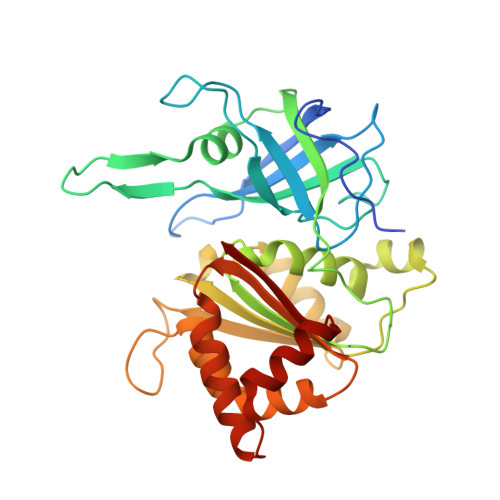C-Terminal Tyrosine of Ferredoxin-Nadp(+) Reductase in Hydride Transfer Processes with Nad(P)(+)/H.
Tejero, J., Perez-Dorado, I., Maya, C., Julvez, M.M., Sanz-Aparicio, J., Gomez-Moreno, C., Hermoso, J.A., Medina, M.(2005) Biochemistry 44: 13477
- PubMed: 16216071
- DOI: https://doi.org/10.1021/bi051278c
- Primary Citation of Related Structures:
1W34, 1W35, 1W87, 2BSA - PubMed Abstract:
Ferredoxin-NADP+ reductase (FNR) catalyzes the reduction of NADP+ to NADPH in an overall reversible reaction, showing some differences in the mechanisms between cyanobacterial and higher plant FNRs. During hydride transfer it is proposed that the FNR C-terminal Tyr is displaced by the nicotinamide. Thus, this C-terminal Tyr might be involved not only in modulating the flavin redox properties, as already shown, but also in nicotinamide binding and hydride transfer. FNR variants from the cyanobacterium Anabaena in which the C-terminal Tyr has been replaced by Trp, Phe, or Ser have been produced. All FNR variants show enhanced NADP+ and NAD+ binding, especially Tyr303Ser, which correlates with a noticeable improvement of NADH-dependent reactions. Nevertheless, the Tyr303Ser variant shows a decrease in the steady-state kcat value with NADPH. Fast kinetic analysis of the hydride transfer shows that the low efficiency observed for this mutant FNR under steady-state conditions is not due to a lack of catalytic ability but rather to the strong enzyme-coenzyme interaction. Three-dimensional structures for Tyr303Ser and Tyr303Trp variants and its complexes with NADP+ show significant differences between plant and cyanobacterial FNRs. Our results suggest that modulation of coenzyme affinity is highly influenced by the strength of the C-terminus-FAD interaction and that subtle changes between plant and cyanobacterial structures are able to modify the energy of that interaction. Additionally, it is shown that the C-terminal Tyr of FNR lowers the affinity for NADP+/H to levels compatible with steady-state turnover during the catalytic cycle, but it is not involved in the hydride transfer itself.
Organizational Affiliation:
Departamento de Bioquímica y Biología Molecular y Celular, Facultad de Ciencias, Universidad de Zaragoza, E-50009 Zaragoza, Spain.
















